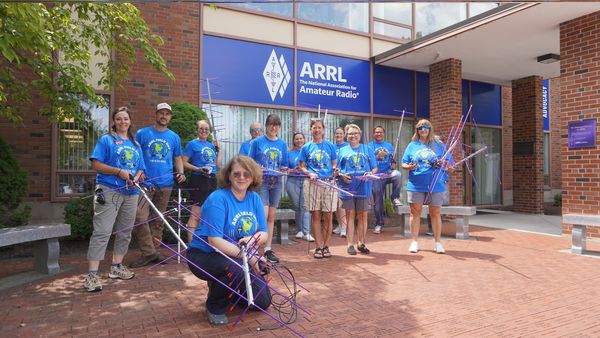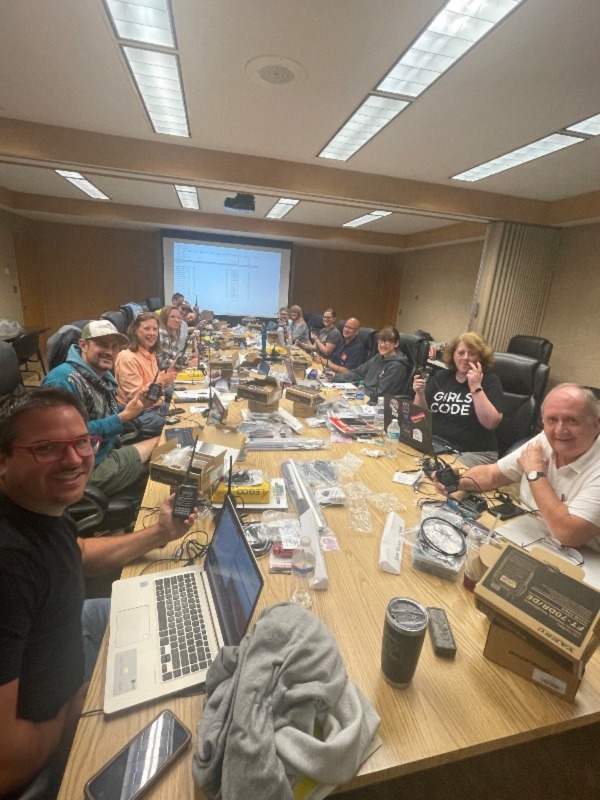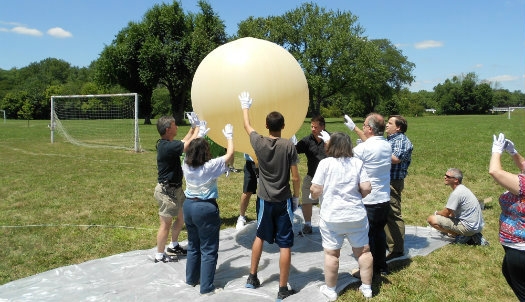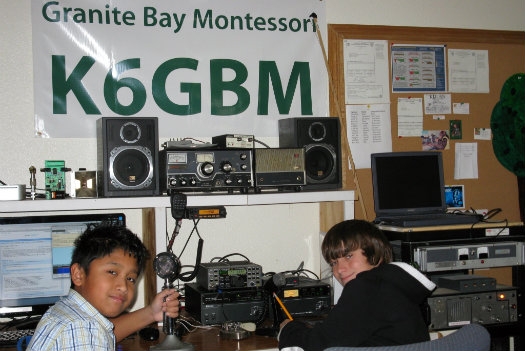Support Teachers Institutes
Your contribution to support ARRL's successful efforts to promote Amateur Radio in stations in schools and to provide professional development for teachers in wireless technology is needed now. Donate Now
Why Bring Amateur Radio into your Classroom?
As a 21st century educator, there are too many demands for your attention and energy. Creating engaging lessons that align with your curriculum standards while holding the attention of your students in a meaningful way takes a lot of time. You need a topic that has multiple points of entry, customizable breadth and depth of content knowledge and is hands-on for a STEM unit. ARRL's Education and Learning Department is aware of your search and presents a solution.
Amateur radio ("Ham radio") has long been fertile for gaining knowledge and skill with electronics technology and for hands-on experimentation and application of technology. Using Amateur Radio in the classroom is a proven and effective way to teach both fact and theory and align with state and national learning objectives-- in STEM curricula-- as well as other content areas.
ARRL's Education & Technology Program (ETP) provides resources and training to help teachers learn how basic electronics and radio science is applied in today's technologies, and how to bring this knowledge to their students. Our ETP aims to achieve wireless technology literacy for teachers and students alike.
FAQ for teachers:
-
Where can I quickly access free curriculum and lesson plans about radio?
Explore these linked resources below to find the perfect lessons and align standards for your students.
ETP Classroom Resources
Curriculum Connections and Benchmarks
ARRL Learning Center - Please search "Lesson Plans." More lesson plans made by teachers for teachers uploaded regularly.
-
What if I need more training before I can teach my students?
We know how much in-person training can benefit both the teacher and the classroom full of students they return to. Learn the basics of radio science to bring back to your classroom. Collaborate and network with other K-12 educators from all over the country. Try some of the hands-on STEM activities yourself before bringing them back to your classroom. Discover why ARRL's Teacher's Institue can lead to a successful implementation of amateur radio in school curriculum, electives and after-school clubs. The ETP is committed to assist in teachers' personal journey of discovering radio. Learn more here.
-
How do I learn more about radio science as a teacher?
Our Learning Center hosts a library of resources for you to begin your own ham radio exploration at your own pace.
Want to join a community of like-minded STEM educators? Sign up to be a Registered ARRL teacher. Learn more about the benefits here.
-
Are there any certifications I need to teach my students about radio?
Short answer - There is no barrier to entry in the short term.
Longer answer - We believe that teachers are enthusiastic and passionate in radio will inspire their students to learn more. We offer several courses on our Learning Center (LC) which will help guide you through different aspects of amateur radio. There are 3 licenses you can earn in as a ham - the first is the Technician Class license and we have a free video series on our LC now.
-
Are there any scholarships or grants offered by ARRL?
Yes! Did you know that the ARRL Foundation manages more than 100 scholarships established by generous donors ranging from $500 to $25,000? Learn more here.
The ETP is currently accepting applications for 3 different grants for classrooms and school clubs that are actively promoting and engaging with amateur radio and wireless technology! Learn more here.
-
How can my school host an ARISS contact?
Here are a few links in our ARISS section to guide you.
- Hosting an ARISS contact 101
- ARISS contact FAQs
- ARISS and Satellite Commuinication Resources
-
We are learning about space! Does studying radio make sense for us?
Yes! Let us introduce you to ARISS (Amateur Radio on the International Space Station)
We believe radio and space science go together like milk and cereal in the morning!
Learn the history of ARISS, watch a recorded ARISS Contact or read about past ARISS contact stories.
-
Hands-on learning with Amateur Radio can develop the skills and interests that lead to professional career choices.
Based on knowledge of electronics/antennas/radio propagation
Consumer Electronics
audio technician (for theaters/aircraft/home)
sound system design
TV and sound system install/service
Space Exploration
satellite/spacecraft design
satellite/spacecraft assembly
satellite/spacecraft monitoring
radio telescope technician or astronomer
Broadcast Radio or Television
technician
weather/communications satellite design or assembly
research into microwave or laser based communication techniques
Medical Fields
x-ray tech
MRI tech
x-ray/MRI machine service
Computer Design/Repair
Cell Phone Systems
tower/network assembly
design
repair
Based on understanding of electro-mechanical systems or sound card based softwaresoftware engineer
signal processing technician
cryptographer
robotics
radio trunking systems design/tech
-
Case Study: Electronics Occupations Program at Turlock High School
The Electronics Occupations Program at Turlock High School is a comprehensive electronics training program which utilizes Amateur Radio activities as cornerstones to motivate and give direction to students. Here is a list of possible careers suggested to students:
Areas of Occupational Specialization
Electronic Consumer Products Service
Audio-Video Repairer
Audiovisual-Aids Technician
Audiovisual Equipment Operator
Radio Mechanic
Radio Repairer
Television & Radio Repairer
Video Installer
Video Operator
Video Tape-Recording Engineer
Cable Television Installer
Cable Television TechnicianCommunications Electronics Technology
Communications Electronics Assembler
Communications Electronics Tester
Marine Radio Installer Servicer
Radio MechanicComputer Servicing Technology
Data Processing Mechanic
Computer Electronics Technician
Computer Service TechnicianAvionics Technology
General Aviation-Avionics Technician
Telephony Technology
Telephone Repairer/Installer
Instrument Repairer
Assembler
Station Installer & Repairer
Equipment InstallerElectrical/Electrician
Electrician Apprentice
Electrician Helper
Airport Electrician
Neon Sign Servicer
Electrician
Electrical Appliance Servicer
Household Appliance Installer
Electrical Repairer
Security Alarm InstallerElectronic Consumer Products Service Categories
DC Circuits
AC Circuits
Solid State Devices
Analog Circuits
Digital Devices
Microprocessor Technology
Lab PracticesTopics within Amateur Radio that are useful to telecommunications careers:
DC Circuits
AC Circuits
Solid State Devices
Analog Circuits
Digital Devices
Microprocessor Technology
Lab Practices
Technical Recording & Reporting
What is the Education & Technology Program?

ARRL developed an education outreach project to introduce teachers to Amateur Radio as an instructional resource and to provide an educationally sound curriculum focused on wireless communications. The goal is to offer the resources to build a foundation of wireless technology literacy among American teachers and students.
What is wireless technology literacy?
A person who is wireless technology literate:
- Is aware of the many types, capabilities, and limitations of wireless technology.
- Has the ability to select appropriate wireless technology to convey the message.
- Has the ability to adapt and adjust wireless technology to meet changing conditions to get the task accomplished.
- Has the ability to use wireless technology to enrich life experience.
What does the Education and Technology Program offer?
Originally known as “The Big Project,” the Education and Technology Program was launched as an entirely donor funded project and today continues to offer resources to schools at no cost with the sustaining support of donors in the amateur radio community.
The Education & Technology Program offers three types of resources to teachers and schools.
- Resources for instruction
- A professional development opportunity, the Teachers Institute on Wireless Technology (open to licensed and unlicensed teachers)
- Grants for radio stations and related equipment

Throughout the year, ARRL offers multiple sessions of the Teachers Institute on Wireless Technology, a 5- day expenses paid professional development seminar, in locations across the U.S. The Teachers Institute has provided teachers from elementary school to the university level with tools and strategies to introduce basic electronics, the science of radio, space technology and satellite communications, as well as weather science, programming microcontrollers and robotics in their classrooms.
Through its Teachers Institutes the ARRL’s Education & Technology Program (ETP) has been working for more than 10 years to promote the teaching of technology. A primary goal of the program is to provide teachers with the equipment needed to begin working with students quickly.
Read more about the workshop.
ETP Schools
To date, the ARRL had provided resources, including radio equipment, to more than 500 teachers and schools! Check out the List of ETP Schools to identify participating schools in your area.

The ARRL Education & Technology Program is supported through generous contributions to the ARRL Education & Technology Fund by individuals, clubs and equipment vendors. We offer a special thanks to the Dayton Amateur Radio Association (DARA), Yaesu, and Ham Radio Outlet for their in-kind support for the Teachers Institute.







